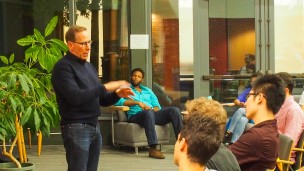
University students gathered in the Career Center to hear a talk from Greg Horowitt, author and venture capitalist, surrounding the topic of innovative ecosystems and investing on Wednesday night, Oct. 7. This event was sponsored by Kai Entrepreneurship Wesleyan, a student organization working to promote openness, inclusion, and community in tech and social entrepreneurship.
“We hope to bridge the skills and mindset gap for liberal arts students interested in entrepreneurship and also advocate entrepreneurship for all through speaker programs, hack-a-thons and design-a-thons, networking sessions, fellowships, trips to tech startup scenes, etc,” wrote Kai Entrepreneurship Co-President Mikaela Reyes ’17 in an email to The Argus.
Kai Entrepreneurship’s ongoing speaker series brings entrepreneurs and investors from across the country. The event with Greg Horowitt this week was the first event this year, and he was more than happy to come to Wesleyan, explained Speaker Series Coordinator Paticha Areepipatkul ’18 and Kai Co-President Alex Garcia ’17.
“To bring speakers to campus, we heavily utilize the Digital Wesleyan alumni network and also just the friends and family of the Wesleyan community,” Garcia said. “Entrepreneurs, tech professionals, and venture capitalists like Greg Horowitt have been really eager and willing to come share their advice with the Wesleyan community.”
Horowitt’s presentation focused on the successful nature of innovative ecosystems, which are those that generate unusual amounts of creativity and output. He discussed the risks and payoffs of these ecosystems.
He began by sharing the idea that investment in innovation and innovative systems, traditionally considered more risky, can have a higher payout than investments in scalable companies that have already proven their success.
“Innovation when it first presents itself looks weird,” Horowitt said.
He mentioned this idea in the context of innovations, including computers and Teslas, ideas that seemed strange or unnecessary expenses at first but then became wildly successful. Horowitt continued by explaining that companies that work off of this innovation and through the lens of big ideas and big changes can create a religious-like following from the consumers and ultimately have a larger impact.
Horowitt then emphasized the value of trust in the field of investing.
“Trust others and be trustworthy yourself,” he said. “Superior people trump superior technology.”
He also suggested trusting different sorts of people rather than the traditional experts of the field.
“Don’t just bring experts into the room,” Horowitt said. “Also be sure to include people who are uniformed and intelligent… Knowledge is less important than imagination.”
Horowitt also spoke to changing the paradigm in investing, by going even further than outside the box.
“The box doesn’t even exist,” Horowitt said.
Horowitt ended the talk with his idea of “rules” for this innovative system.
“Be prepared to break the rules,” he said. “Pay it forward.”
Attendees were excited by the speech and Horowitt’s principles.
Garcia mentioned his excitement for the innovation in personal communities and networks discussed in Horowitt’s speech.
“The question of how do you foster innovation in your own networks is something that really interests me most about Greg’s work,” Garcia said. “I really believe it’s the people and structure that make a place innovative–it doesn’t have to be confined to the geographical location that is the Bay Area.”
Mattison Asher ’17 shared what he gleaned from Horowitt’s speech.
“The ability to adapt is far more important that the knowledge you have,” Asher said.
Christina Sickinger ’18 was one of a number of students not involved in the field who attended the discussion.
“I like how he emphasized the importance of imagination,” Sickinger said. “It shows you don’t necessarily need a lot of technical knowledge to have a good idea and make it work.”
As for future plans, Kai Entrepreneurship has many ideas for students to become involved with the group. The group is planning a trip to various companies in Silicon Valley over spring break, which they had done last semester as well, and encourages students to take part in its Kai Fellowship, a program that includes mentorship and access to Kai’s community network and resources.
“Anyone can join in on the fun, with our guest speaker series, trips (with applications released weeks before the actual trip), hack-a-thons & design-a-thons and other events,” Reyes wrote. “It’s a very open community and we encourage everyone to join.”


Leave a Reply